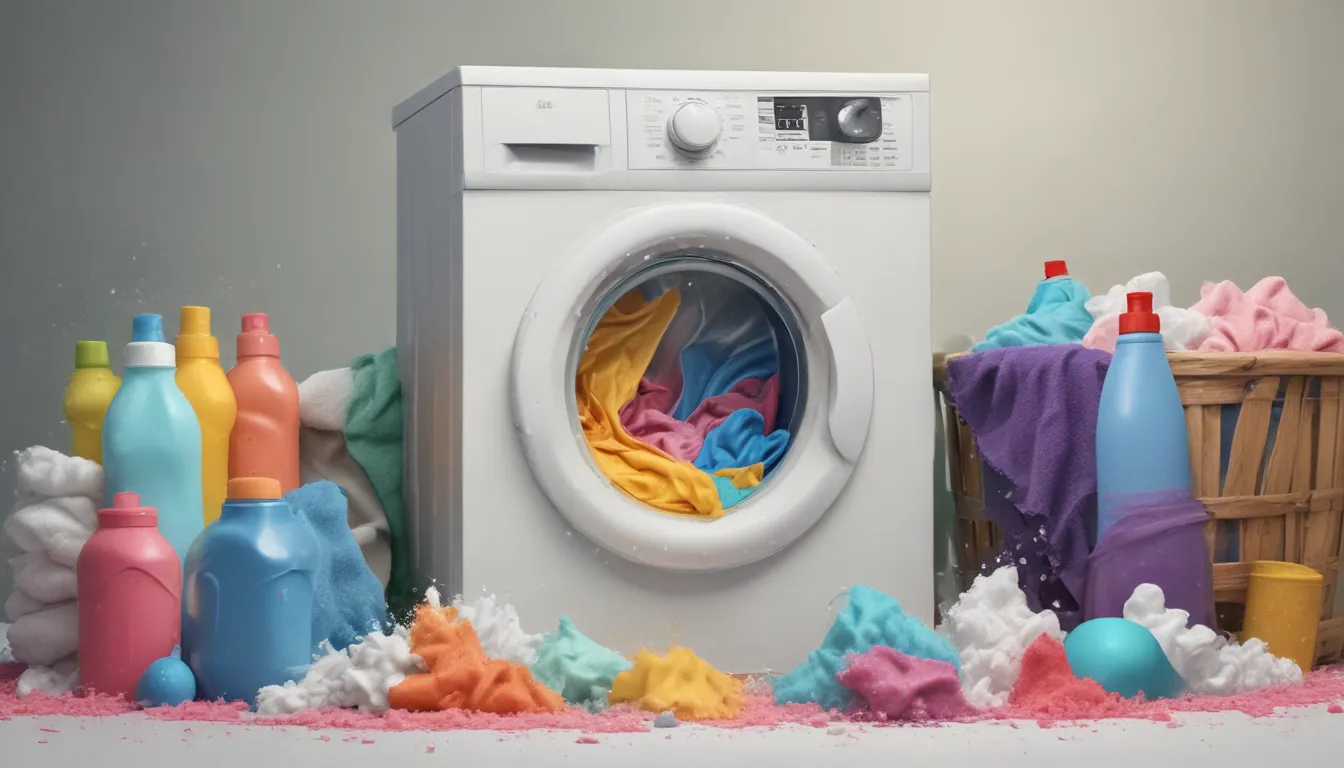A Note About Images: The images used in our articles are for illustration purposes only and may not exactly match the content. They are meant to engage readers, but the text should be relied upon for accurate information.
Detergent, a household staple, plays a crucial role in keeping our clothes and dishes clean. While we use detergent daily, there are many fascinating facts about this cleaning agent that often goes unnoticed. From its invention to its impact on the environment, detergent is a captivating subject for those curious about its inner workings. In this article, we will explore 15 intriguing facts about detergent that will expand your knowledge and pique your interest in this essential household item. Let’s delve into the secrets behind the everyday product that keeps our belongings looking their best!
The Fascinating World of Detergent
- Detergent revolutionized cleaning with its surfactant-based formula, outperforming traditional soap.
- Different detergents are tailored for specific tasks, ranging from laundry to dishwashing.
- Eco-friendly options are available to minimize the environmental impact of detergents.
The Birth of Detergent: A Modern Cleaning Revolution
Detergent as we know it today was invented in the early 20th century as an innovative alternative to soap. Its formulation, based on synthetic surfactants, proved to be more effective in removing dirt and stains.
Surfactants: The Magic Ingredients in Detergents
Surfactants, the primary components of detergents, work by lowering the surface tension of water. This allows water to penetrate fabrics more easily, dissolve dirt, and lift stains, revolutionizing the cleaning industry.
Detergents vs. Soaps: The Ultimate Cleaning Showdown
Detergents have a clear advantage over soap – they can be used in hard water without leaving a residue. Additionally, detergents excel at removing oil and grease stains, making them incredibly versatile for various cleaning tasks.
The Rise of Biodegradable Detergents: A Sustainable Solution
In response to growing environmental concerns, biodegradable detergents have gained popularity. These detergents break down into harmless substances, minimizing their impact on the environment.
Detergents and Water Pollution: A Cautionary Tale
Improper disposal of detergent wastewater can contribute to water pollution, particularly if detergents contain phosphates. Eco-friendly detergents are crucial for protecting aquatic ecosystems.
The Science of Stain Removal: Enzymes to the Rescue
Detergents contain enzymes that target specific types of stains, such as proteins, fats, and carbohydrates. This enzymatic action helps break down stains effectively and remove them from fabrics.
Concentrated Detergents: Doing More with Less
Concentrated detergents are gaining popularity due to their smaller packaging and reduced environmental footprint. These highly concentrated formulas require less product per load, offering both economic and ecological benefits.
Embracing Plant-Based Detergents: A Greener Choice
Plant-based detergents, derived from renewable resources like vegetable oils, are becoming increasingly popular among environmentally conscious consumers. These detergents provide a natural alternative while maintaining effective cleaning power.
Decoding Foam Formation: The Role of Surfactants
Detergents produce foam due to the surfactants they contain. While foam doesn’t necessarily indicate cleaning effectiveness, it has become synonymous with cleanliness in the eyes of many consumers.
Detergents and Fabric Care: A Delicate Balance
Certain detergents can be harsh on fabrics, leading to fading or loss of shape over time. Choosing a detergent suitable for the fabric type is essential to preserve its quality and longevity.
Addressing Allergies: Hypoallergenic Detergents for Sensitive Skin
Some detergents contain fragrances or additives that may trigger allergic reactions in individuals with sensitive skin. Hypoallergenic detergents offer a gentle alternative for those prone to allergies.
Eco-Friendly Packaging: A Sustainable Solution
Many detergent manufacturers are adopting eco-friendly packaging options, such as refillable or recyclable containers, to reduce plastic waste and promote sustainability.
Tailored Detergents for Different Tasks
Detergents come in various formulations for specific purposes, including laundry, dishwashing, and household cleaning. Each type is designed to tackle common dirt and stains found in these areas.
Safeguarding Colors: The Magic of Color-Safe Detergents
Color-safe detergents are specially designed to preserve the vibrancy and integrity of colored fabrics. They prevent color bleeding and fading, allowing clothes to maintain their original brightness.
The Art of Detergent Advertising: Storytelling Through Cleanliness
Detergent advertisements have evolved over the years to focus on storytelling and emotional appeal. Brands highlight the efficacy of their products while resonating with consumers’ desires and aspirations.
In Conclusion
Detergent is not just a mundane household product – it is a fascinating blend of science, sustainability, and efficacy. From its innovative history to its modern applications, there is much to explore in the world of detergents. Whether you’re intrigued by the chemistry behind detergents or simply want to uncover some intriguing facts, delving into the realm of detergents can be both educational and enthralling.
Frequently Asked Questions
- How do detergents remove stains?
-
Detergent molecules have a hydrophilic head and a hydrophobic tail, allowing them to break down grease and dirt. They surround the stain and lift it away from the fabric or surface.
-
Are detergents harmful to the environment?
-
Some detergents contain harmful chemicals that can harm the environment, especially when released into water bodies. Opting for eco-friendly detergents can minimize this impact.
-
Can I use detergent for purposes other than laundry?
-
Yes, detergent is versatile and can be used for various cleaning tasks, including dishwashing and surface cleaning. Just ensure you follow the instructions for each application.
-
Are all detergents the same?
-
No, detergents vary in their formulations and are designed for specific cleaning needs. Choosing the right detergent for the task at hand is essential for optimal results.
-
Can excessive detergent usage damage clothing?
- Using too much detergent can lead to residue buildup on clothes, causing stiffness and potential damage over time. Following recommended dosages is key to preserving your garments.
When it comes to choosing the right detergent, whether for laundry, dishes, or general cleaning, it’s essential to consider factors such as environmental impact, fabric care, and efficacy. By opting for eco-friendly, biodegradable options and tailoring your choice to the specific task at hand, you can ensure a clean and sustainable household. So, next time you reach for that bottle of detergent, remember the intriguing facts and valuable insights behind this everyday essential.






